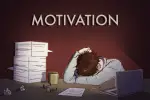You are probably beginning to feel a bit of burnout with the onset of finals among all of your other responsibilities. A certain degree of stress is normal and even necessary. Stress, in small amounts, can be useful. It can motivate you to do well on assignments and push you to work to your highest potential. Think about it: If you did not feel at least a little bit of stress, you would not feel motivated to study for that exam you have coming up. In large amounts, however, stress can be detrimental, both for your physical and mental health.
Too much stress can lead to burnout, a severe form of exhaustion. Unfortunately, burnout is one of the most common symptoms of excessive stress, and it affects millions of college students all over the country. Although burnout is an emotional state, it can also lead to symptoms that are physical and behavioral in nature. Burnout is especially harmful when combined with other emotional disturbances, such as depression or anxiety.
Physical symptoms of burnout include frequent headaches and/or muscle pain, lethargy and changes in your appetite and/or sleeping habits. Emotional symptoms of burnout include feelings of detachment, whether it be from others, yourself or the world. One may also experience a loss of motivation and/or an increasingly negative outlook on life. Burnout can also manifest itself behaviorally, with the potential to cause individuals to procrastinate, withdraw from their responsibilities or turn to illicit substances or alcohol as a coping mechanism.
If left untreated, burnout can result in negative long-term health effects, such as extreme fatigue, a weakened immune system and reduced levels of stress tolerance. It is very important that you know how to identify the symptoms of burnout so that you can stop them in their tracks and prevent them from getting worse. Thus, I have put together the following tips that will help you avoid burnout so that you can make the most of finals week and end the semester on a strong note. Adherence to these tips will significantly decrease your chances of experiencing stress, which will in turn prevent you from feeling burned out.
1. Keep Track of Deadlines
The first tip is arguably the most important of all: Pay attention to deadlines. Sticking to deadlines is an important skill to have in both school and life. Right now, you may be feeling very tempted to put off all of your assignments until the last minute. This urge, although it may be strong, must be abandoned. Procrastinating on your work may provide you with temporary short-term relief; however, it will only end up hurting you in the long run. If you submit your work on time, you will not only feel good about yourself, but you will also save yourself the burden of burnout.
If you wait until the very last minute to complete your assignments, you will most likely end up very stressed, which will greatly increase your chances of experiencing burnout. So, what’s the moral of the story? The sooner you master the art of turning in your work on time, the better. If you are someone who is prone to procrastination, there is no need to fear. It is not too late to rid yourself of this habit. Once you win the fight against the monster that is procrastination, your chances of becoming burnt out will simultaneously decrease.
2. Know Your Tasks
The second tip is to keep track of all of your assignments. You can choose to write down your deadlines in a planner, calendar or on an electronic device such as a phone or a computer. Personally, I keep track of my deadlines on a calendar. This calendar is hung directly in front of my work desk, in plain view. I would strongly recommend the calendar method, as it has helped me stay organized and on top of all of my assignments. I have been using this method since my sophomore year of college, and I have not missed a single deadline since. I understand, however, that this may not be the most effective strategy for everyone, which is why I have provided alternatives. My logic for this is simple: It is harder to forget something that you have written down.
3. Allow Breaks
Next, you need to allow yourself an adequate number of breaks. Once you start an assignment, it is tempting to rush through it in an attempt to get it over with in one sitting (I know I have definitely done this before), but it is imperative that you give yourself short breaks throughout. Although it might seem counterintuitive on the surface, taking sporadic 10 to 15-minute breaks while doing work has been proven to increase productivity levels.
In addition to these brief breaks, you may want to reward yourself along the way. This will provide you with the incentive you need to keep you moving forward. For example, you can gift yourself a handful of M&M’s every time you finish reading a chapter in your English novel or writing a page for your history paper. It is also important that you set aside time for enjoyable activities. Although your workload may be through the roof right now, you must not forget to take some time to engage in activities that make you happy, whether that be playing an instrument, working out at the gym or spending time with friends.
4. Take Care of Yourself
Last but not least, you must not sleep on the importance of getting enough sleep, drinking an adequate amount of water and maintaining a healthy, balanced diet. See what I did there? At the start of the semester, I highly underestimated the benefits of a good night’s sleep and a nutritious diet. Although this may sound hackneyed, I cannot stress enough how vital it is to establish and maintain a healthy sleeping and eating schedule, especially as a busy college student.
Lucky for you, there are several apps out there that can help you with this. It is also very important that you drink enough water throughout the day, as this will help you feel good on the inside and out, which will lead to improved academic performance. If you feel that you are struggling to get the proper sleep or nutrition you need, do not hesitate to reach out for help. You can always turn to a health professional, such as a doctor or a dietician and/or your school counselor for guidance.

















